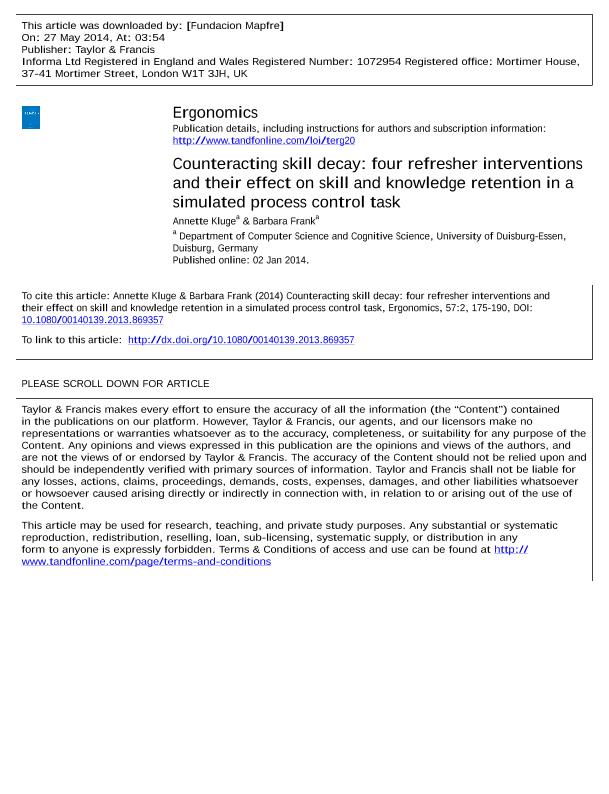Counteracting skill decay : four refresher interventions and their effect on skill and knowledge retention in a simulated process control task

Contenido multimedia no disponible por derechos de autor o por acceso restringido. Contacte con la institución para más información.
| Tag | 1 | 2 | Valor |
|---|---|---|---|
| LDR | 00000cab a2200000 4500 | ||
| 001 | MAP20140019199 | ||
| 003 | MAP | ||
| 005 | 20140530130413.0 | ||
| 008 | 140527e20140203esp|||p |0|||b|spa d | ||
| 040 | $aMAP$bspa$dMAP | ||
| 084 | $a875 | ||
| 100 | 1 | $0MAPA20140009404$aKluge, Annette | |
| 245 | 1 | 0 | $aCounteracting skill decay$b: four refresher interventions and their effect on skill and knowledge retention in a simulated process control task$cAnnette Kluge, Barbara Frank |
| 520 | $aIn process automation, skill decay has not been investigated systematically. In two experimental studies, refresher interventions (RIs) were compared to support skill and knowledge retention of a start-up procedure on a simulated process control task. Based on theories of proceduralisation, the testing-effect' and mental practice, four different RIs were designed. In Study 1 (N = 68), two experimental groups (EGs) received either an RI called Practice' or an RI called Skill Demonstration'. Both RIs support skill retention, but the Skill Demonstration-RI performed with a higher mental workload. In Study 2 (N = 68), two EGs received an RI called Symbolic Rehearsal' or an RI called Procedural Knowledge Test', and aimed at supporting knowledge retention. Both EGs supported knowledge retention but showed moderate skill decay. Results imply that RIs affect skill and knowledge retention differently and should be applied in accordance with the task requirements and their dependence on accurate skill or knowledge maintenance. | ||
| 773 | 0 | $wMAP20100019818$tErgonomics : the international journal of research and practice in human factors and ergonomics$dOxon [United Kingdom] : Taylor & Francis, 2010-$x0014-0139$g03/02/2014 Volumen 57 Número 2 - febrero 2014 |

